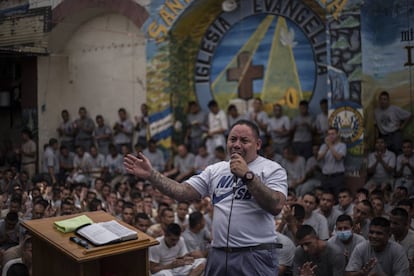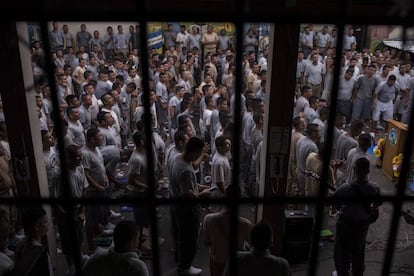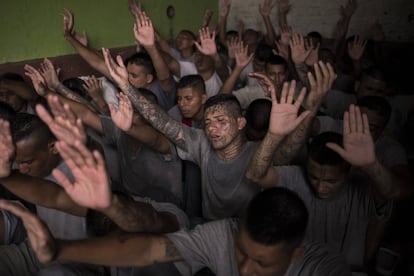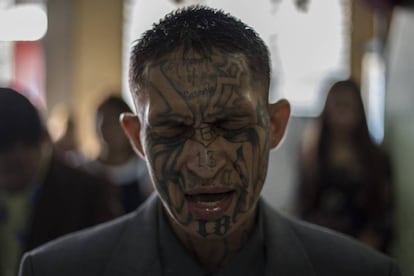How El Salvador’s deadliest gang members found God behind bars
At San Francisco Gotera prison, 1,600 inmates have exchanged violence for love preached in the Bible


It’s 9am, and some of the most violent and bloodthirsty inmates of El Salvador sing, pray and passionately call out to Christ while they read the Bible in the prison’s courtyard. Hundreds of men, tattooed to their eyebrows, have been doing this non-stop for two hours.
They have given themselves to Christ. They show this by jumping, crying, beating their chests, calling out to the sky and playing music, lots of music. At least five trumpets, two guitars, three tambourines and one drum are on hand to celebrate Jehovah. Sometimes the inmates rejoice at dawn, other times throughout the night.
Even though we are prisoners, we feel free because once God has opened your heart, there is no going back
Daniel Méndez, member of MS-13
It’s Monday, January 28, and in the courtyard of the San Francisco Gotera prison, located in Morazán in El Salvador, a powerful masculine roar recites verses from Corinthians. “I will rejoice, I will rejoice, I will rejoice, Jehovah has taken away my pain because he has freed me…”
The evangelical pastor who speaks to the crowd of inmates has a huge 18 tattooed on his face, a symbol of the gang he once swore eternal loyalty to. He also has another one on his neck. These tattoos are just part of the canvas of skulls, phrases, demons and other numbers that decorate his skin and serve as a reminder of his past. In front of him, sit more than 1,600 gang members (in a prison designed for 200), men with convictions for murder, extortion and rape.
This army of young males in service to Christ listen eagerly. Without any shame, they show their tattoos and wounds from a war that ensnared them since childhood: the conflict between warring gangs Mara Salvatrucha (MS-13) and the two factions of the 18th Street (Barrio 18) gang, the Sureños and the Revolucionarios.

To one side of the altar there is a young man with a gunshot wound on his face. Two rows back, another one is missing an ear. A man to his right raises his severed hand to the sky and calls out with closed eyes. In one of the first rows, Óscar Vladimir Martinez, who has six bullet wounds in his stomach, sings enthusiastically. He received the last shot when police had already arrested him and handcuffed him on the ground.
In a country with a population of fewer than six million, the gangs make up an army of 64,000 men who terrorize the neighborhoods where they hold relentless control. With more than 50 homicides for every 100,000 people, the Central American country is the second-most-violent in Latin America after Venezuela, according to InSight Crime, an organization that studies violence in the region. In the prisons of El Salvador, 42,000 inmates are in penitentiary centers like Gotera, where overcrowding exceeds 800%, according to official figures.
But peace has come to this prison thanks to the Bible and the pastors, who have managed to achieve several miracles: there is no violence, everything is perfectly clean and organized despite the overcrowding, and the prisoners treat each other with respect. And they have achieved the seemingly impossible – members of rival gangs are living together in the same space, something that is fairly normal inside the prison’s walls but unthinkable outside.

“I realized that I was killing and defending streets that weren’t mine, but Christ’s,” says 27-year-old Jorge Stanley, a former member of Revolucionarios-18, who says he was was sentenced to 97 years in prison for “homicides, extortion and violent robberies.”
“Even though we are prisoners, we feel free because once God has opened your heart, there is no going back,” adds Daniel Méndez, from the MS-13 gang.
Christ first came to inmates in April 2015 when the prison became exclusive for members of the Revolucionarios faction of the 18th Street gang. A group began to pray and spend an increasing amount of time in front of the Bible. First there were just a few of them, who were guided through the Gospels by a pastor just as heavily tattooed as them. This small group then began to convince others to join, and three years later, all of them are now “sheep,” as they like to call themselves.
To get to Sector 5 of the San Francisco Gotera prison you need to meander through a number of hallways. The sector is actually just a small courtyard and a room six steps long and four wide where 107 people sleep every day. Some are in bunks and others in hammocks that crisscross across the length of the room, three meters above the ground.

In spite of the small space, the peeling walls and the constant presence of guards, the inmates look clean and their clothes are always neatly folded next to their cots. The gang members have imposed a rigorous code of conduct and those who break it face punishments such as fasting or reading the Bible for an entire day against the wall.
The prison is home to inmates who have participated in the most horrible massacres of recent years. This includes the brutal murder in the municipality of Opico in April 2016, when a group from the Revolucionarios faction went to search for members of the opposite gang. When they couldn’t find them, they unleashed their violence upon eight employees of a power company and three day laborers who happened to be passing by. They shot one of them first, then they broke the neck of another. The rest were mown down by machine gun fire and finished off with machetes. One of the gang members laughed as he recorded the murders on his phone.
And there was the killing that took place on a minibus in the Jardín de Mejicanos area in 2010, when a group of gang members burned 17 people alive. The members doused the vehicle in fuel and locked the doors to prevent anyone from escaping. The only one who managed to get out was shot dead.

“This is more than a prison, it’s a temple,” explains one of the pastors, as he takes off his shirt to show off the six gunshot wounds on his torso.
The religious experiment does not extend past the prison’s four walls. At the end of his sentence, only Nelson Moz, a 52-year-old pastor from the Ben-Ezer church, will wait to welcome the inmates. In his church in the Dina de San Salvador area, he has set up, without a cent, a bakery where they can make a living.
The basement of this church provides shelter for reformed gang members who have completed their sentences but who face social stigma because of their tattooed faces. Perhaps that’s why the story of Jesus healing the lepers, who were despised by all, is the inmates’ favorite psalm.
English version by Asia London Palomba.
Tu suscripción se está usando en otro dispositivo
¿Quieres añadir otro usuario a tu suscripción?
Si continúas leyendo en este dispositivo, no se podrá leer en el otro.
FlechaTu suscripción se está usando en otro dispositivo y solo puedes acceder a EL PAÍS desde un dispositivo a la vez.
Si quieres compartir tu cuenta, cambia tu suscripción a la modalidad Premium, así podrás añadir otro usuario. Cada uno accederá con su propia cuenta de email, lo que os permitirá personalizar vuestra experiencia en EL PAÍS.
¿Tienes una suscripción de empresa? Accede aquí para contratar más cuentas.
En el caso de no saber quién está usando tu cuenta, te recomendamos cambiar tu contraseña aquí.
Si decides continuar compartiendo tu cuenta, este mensaje se mostrará en tu dispositivo y en el de la otra persona que está usando tu cuenta de forma indefinida, afectando a tu experiencia de lectura. Puedes consultar aquí los términos y condiciones de la suscripción digital.








































